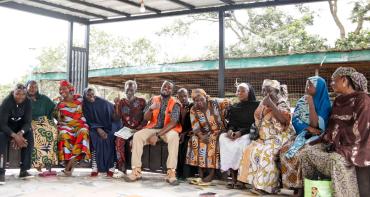As the OMICRON variant threatens a wave of global havoc, the 1.8 billion young people worldwide remain vulnerable to the persisting impact of Covid-19, and support from Youth Workers is needed now more than ever.

A blog by Charlotte Barcham
This is a point made by Oliver T. Mhuriro, one of 17 students to graduate with a Bachelor of Arts in Youth and Community Development (BAYCD) from the Namibia College of Open Learning (NAMCOL) at the Jetu Jama Centre in Windhoek.
The programme was Namibia’s first-ever higher education course for Youth Workers, and the graduation for this first cohort was a historic milestone.
Originally from Zimbabwe, Oliver is passionate about making a difference within the youth development sector and using his new qualification to inspire upcoming generations to participate in youth work.
His course was created through a partnership of NAMCOL and the Commonwealth Higher Education Consortium for Youth Work (CHEC4YW), which the Commonwealth Secretariat leads.
It is designed to address the challenges youth workers face today by improving their skills, promoting the professionalisation of their work, and creating new career opportunities.
Making History
After three years of studying the new course, Oliver graduated with a ‘Cum Laude’ (first-class honours). Speaking about the collaboration between the Commonwealth and NAMCOL, he said: “The strategic partnership of NAMCOL, CHEC4YW, and the Commonwealth Secretariat is the one that facilitated the ‘reality’ of starting the Bachelor of Arts in Youth & Community Development (BAYCD) programme at NAMCOL.
“Without this strategic partnership, there couldn’t have been any higher education institution in Namibia to offer a degree programme in Youth Work studies.”
Republic of Namibia Minister, Hon. Agnes Basilla Tjongarero recognised the monumental achievement saying: “The Ministry of Sport, Youth and National Service welcomes and congratulates the first cohort of the Bachelor of Youth and Community Development.
“Over the years there has been a lack of relevant qualifications in the field of Youth Work and this achievement by the Namibia College of Open Learning in collaboration with the Commonwealth Higher Education Consortium for Youth Work will enable Namibia to develop a team of professionals in Youth Work.”
NAMCOL Director, Dr. Heroldt Murangi added: “We are glad that as an institution on the 16th of September [2021] we made history, we had our first graduates from our degree programme. 17 students graduated, 10 females and seven males.”
The first-ever Namibia Youth Workers’ Association
There was also a recognition of the urgent need for youth workers in Namibia to form an association to further facilitate youth work professionalisation and establish a code of conduct to regulate the profession.
Oliver and three other BAYCD graduates are part of a steering committee that is currently working towards the establishment of the first-ever Namibia Youth Workers’ Association (NYWA). And they are getting guidance, financial support, and mentorship from the Commonwealth Alliance of Youth Workers’ Associations (CAYWA).
“We look forward to hitting the ground running in 2022 in our efforts to formally establish NYWA,” Oliver explained.
He added: “I would like to advise other youth workers from across the Commonwealth who haven’t yet formed a Youth Workers’ Association to first organise themselves and then get in touch with CAYWA which is an arm of The Commonwealth Secretariat that is always ready to give mentorship and a helping hand.”
Mental health
Oliver went on to highlight the severe impact of the pandemic on young people and outlined the actions that he feels must follow: “The issues affecting young people, for example, mental illness, substance abuse and even loneliness, are increasing during the Covid19 pandemic period, and this trend isn’t improving.
“It is during challenging times such as these that young people need more access to youth workers who work in various settings for example in youth centres, and in street-based youth work and after-school programmes.”
The Commonwealth Secretariat has pledged to put youth work at the forefront of their new four-year strategic plan.
This year, they hosted two virtual cafés for youth workers to share ideas, create networking opportunities and explore strategies such as the critical pedagogy approach, which promotes integrating social justice and democracy into teaching and learning.
Dr Amina Osman, Education Advisor at the Commonwealth Secretariat, said: “Youth work is a professional practice with strong evidence of its benefits to young people and communities.
“We call for youth work to be deeply embedded in national youth policy so that youth work graduates can aspire to a long-term career prospect. This will encourage many more students to enrol in the degree courses.”



